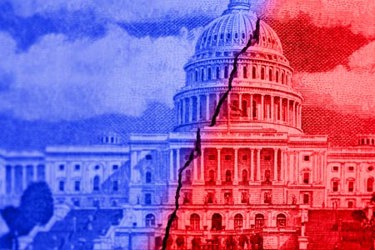How Government Shutdowns Set Back Clinical Trials
By Denise N. Bronner, Ph.D., founder & CEO, Empactful Ventures

When the federal government shuts down, news coverage tends to spotlight furloughed workers, frozen paychecks, or the political drama playing out in Washington. What gets less attention is how these lapses stall the engine of scientific progress. For clinical research, even a brief shutdown can trigger cascading consequences: disrupted operations, wavering patient participation, delayed approvals, and setbacks for urgently needed therapeutics.
Clinical research thrives on continuity. It is built on tightly orchestrated timelines, fragile patient trust, and a steady flow of regulatory and financial resources. When that continuity is interrupted, the ripple effects extend far beyond missed deadlines. They reach the lives of patients who depend on trials for care and the future of therapies waiting to move from pipeline to practice.
Regulatory Bottlenecks & Uncertainty
The FDA sits at the center of clinical research, reviewing new drug applications, monitoring safety, and ensuring compliance. A shutdown leaves the agency with only a skeleton crew. Historically, about one-third of FDA staff have been furloughed during extended shutdowns, forcing the Agency to pause most routine operations. New drug and device submissions may be accepted, but reviews stall. Site inspections and audits, critical for moving programs forward, are postponed. And sponsors often find their regulatory queries met with silence.
These delays may seem procedural, but they create real-world consequences. A biotech preparing to launch a pivotal trial might suddenly find its timeline upended. A CRO monitoring multiple sites may have to cancel visits, raising questions about data integrity. For investors and partners, the unpredictability of the process undermines confidence. In research, lost time is costly.
Funding Freezes At NIH
If the FDA is the gatekeeper for new therapies, the NIH is the lifeblood of much of America’s academic and early-stage science. Shutdowns freeze that lifeblood. NIH typically continues to accept grant applications but cannot review or award them until funding is restored. This bureaucratic pause translates into payroll stress for labs and research centers, especially smaller teams without diversified funding sources.
During the 2018–19 shutdown, the NIH Clinical Center in Bethesda was forced to delay enrolling new patients, including children waiting to join cancer trials. For those families, the shutdown was a life-or-death interruption. In addition, early-career scientists and postdocs, often the most vulnerable members of the research workforce, are left in limbo. Funding gaps of just 30 days have been shown to contribute to talent attrition, pushing skilled researchers out of science altogether.
Operations On Shaky Ground
The operational backbone of clinical trials (e.g., sites, monitors, laboratories, and logistics) also bends under the pressure of a shutdown. Site monitoring visits are rescheduled, delaying data cleaning and query resolution. Import/export processes for investigational products slow as customs operations back up. Partnerships with federal labs, from animal facilities to data repositories, grind to a halt. Each delay creates a domino effect across the already complex timelines of a trial.
For sponsors, the lesson is clear: resilience requires redundancy. Having contingency monitors, pre-positioned supplies, and clear communication with sites becomes critical when the usual channels stall. But even with preparation, operations rarely emerge unscathed.
Patients Shoulder The Burden
The most overlooked consequence of a shutdown is the effect on patients. Trials ask participants to dedicate time, energy, and often money. Even when investigational products are provided at no cost, patients face transportation expenses, childcare demands, and lost wages from missed work. Managing side effects can mean more doctor visits and out-of-pocket costs.
When the government shuts down, some patients could be doubly strained if they rely on federal employment, disability payments, or other forms of federal assistance; their household finances are directly disrupted. In those moments, continuing participation in a trial may feel untenable. For some, the decision is not about medical trust but about economic survival.
Moreover, when NIH centers pause enrollment (as they did in 2013 and again in 2018), patients waiting for a trial slot may be turned away. For individuals with advanced cancers or rare diseases, those missed windows represent opportunities that may never come again. The erosion of trust is equally damaging: once patients perceive that research is unstable, they may hesitate to enroll in future studies.
Final Thoughts
Shutdowns may feel inevitable in today’s political climate, but their impact on research does not have to be. Sponsors, CROs, and sites can build resilience by filing regulatory documents early, securing bridge funding for staff, and communicating transparently with patients about contingency plans. Institutions can develop “shutdown-proof” funds for critical patient care and research continuity. And as an industry, we must continue to advocate for policies that safeguard scientific progress from political gridlock.
Clinical research is a lifeline for patients and a driver of innovation, and each shutdown chips away at both. Operations stall, patients are forced into impossible choices, and the march toward new therapeutics slows. In an era when trust in research is already fragile, we cannot afford these fractures. Politics may pause Washington, but patients cannot wait.
References:
Holland & Knight. The Government Shutdown and Its Effects on the FDA. 2019.
NIH. Federal Government Shutdown Policy.
Oncology Times. Government Shutdown Disrupts NIH Clinical Center Patient Care. 2019.
BioSpace. FDA Delays Likely As Shutdown Looms. 2023.
ProPharma Group. Impact of US Government Shutdown on FDA. 2023.
National Brain Tumor Society. What Patients Need to Know During Government Shutdown. 2023.
Nature. Science Faces Uncertainty Amid US Government Shutdown Threat. 2025.
About The Author:
 Denise N. Bronner, Ph.D., has roughly 15 years of organizational thought leadership experience within the global healthcare space and has held various roles in academia, consulting, pharma, and venture capital. During her career, she has specialized in health equity, data-driven global therapy program strategy development, pitch and storytelling refinement and identifying business opportunities within pharma. Beyond her professional endeavors, she’s passionate about enhancing diversity in STEM fields, serving on advisory boards, participating as a judge in pitch/business competitions, and mentoring young professionals. She holds a bachelor’s degree in biological sciences from Wayne State University, a Ph.D. in microbiology & immunology from the University of Michigan - Ann Arbor, and certification from the Venture Capital Executive Program from UC Berkeley Haas School of Business. She is the founder of Empactful Ventures, which currently consults healthcare-focused startups and venture funds, and she is a member of the Clinical Leader editorial board.
Denise N. Bronner, Ph.D., has roughly 15 years of organizational thought leadership experience within the global healthcare space and has held various roles in academia, consulting, pharma, and venture capital. During her career, she has specialized in health equity, data-driven global therapy program strategy development, pitch and storytelling refinement and identifying business opportunities within pharma. Beyond her professional endeavors, she’s passionate about enhancing diversity in STEM fields, serving on advisory boards, participating as a judge in pitch/business competitions, and mentoring young professionals. She holds a bachelor’s degree in biological sciences from Wayne State University, a Ph.D. in microbiology & immunology from the University of Michigan - Ann Arbor, and certification from the Venture Capital Executive Program from UC Berkeley Haas School of Business. She is the founder of Empactful Ventures, which currently consults healthcare-focused startups and venture funds, and she is a member of the Clinical Leader editorial board.
